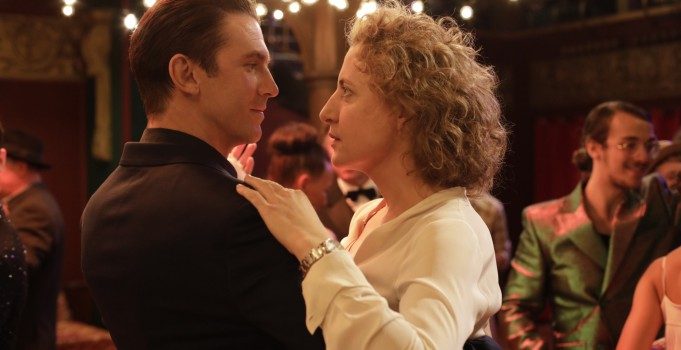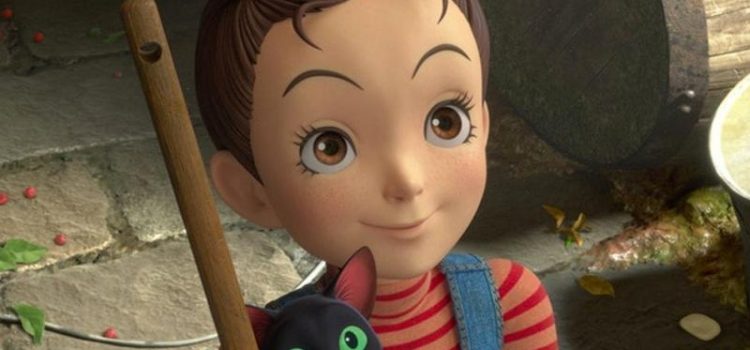By Alex McPherson
Director Maria Schrader’s sci-fi dramedy, “I’m Your Man,” presents multifaceted questions about love, humanity, happiness, and loneliness in a time when technology molds to fit our every need.
Based on a short story by Emma Braslavsky, the film centers around Alma (Maren Eggert), an anthropologist working for the Pergamon museum in Berlin, studying Sumerian cuneiform tablets for traces of poetry. She’s a closed-off workaholic leading a mundane life — getting along well with co-workers, but holding deeper sadness and resistance to anything resembling romance. In exchange for more funding for her research, Alma reluctantly agrees to participate in a three-week-long study where she’s paired with a humanoid “man of her dreams” named Tom (Dan Stevens).
This android is calibrated to match her personality and adapt over time in accordance with Alma’s reactions. Unsurprisingly, things don’t go smoothly at the beginning. From the moment Tom speaks the phrase, “Your eyes are like two mountain lakes I could sink into,” Alma isn’t impressed.
As the days go on, however, Tom grows more sensitive, relatable, and attractive to her. Alma slowly but surely starts falling for him, while simultaneously regretting her burgeoning feelings, and ends up confronting the roots of her melancholy.
Although this android might develop like a person would, is Alma’s love authentic, or purely artificial? What is Alma willing to sacrifice to achieve satisfaction in a relationship, and should humanoids like Tom be available to the public in an increasingly isolated world? Schrader doesn’t opt for easy, convenient answers — which renders “I’m Your Man” a more contemplative watch than viewers might expect.
In large part, thanks to Alma’s complexity as a protagonist and Stevens’ poignant, drolly humorous performance as Tom, the film soars in both moments of light-heartedness and serious drama, with a story ripe for discussion once the credits roll.
Indeed, “I’m Your Man” isn’t so much a conventional science-fiction story as it is an exploration of desire and the befuddling mechanics of relationships. On top of that, Schrader’s film has comedic moments sprinkled throughout — mostly involving Tom’s flawed attempts at fitting in — that lend the proceedings a certain gentleness, not exploiting the premise for crowd-pleasing cheesiness.
Eggert’s masterful performance conveys Alma’s yearning, resentment, joy, grief, and emotional growth in a way that ensures we always empathize with her as she navigates morally fraught waters.
The script — co-written by Schrader and Jan Schomburg — gives credence to multiple, contrasting perspectives regarding her situation, and encourages viewers to ponder some of the same topics themselves in their own lives. Does the end goal of true happiness justify the means, and is the pursuit of happiness something that makes us human to begin with?
Stevens, while giving a less naturalistic performance, is absolutely outstanding as Tom. For all his robotic, stilted movements and occasional cluelessness, Stevens imbues him with a tangible soul nonetheless, as he learns and evolves from his experiences. He veers further from his robotic roots into someone approaching a human, as well as a mirror for Alma to explore her own flaws and potential for change.
Funny, cathartic, and bittersweet, this intelligent love story rarely falters. The film’s slow pace is guided along by Benedict Neuenfels’ crisp, eye-popping cinematography — initially framing Alma behind glass, looking outside with her manufactured reflection standing beside her — and Tobias Wagner’s jazz-inflected score that becomes rather haunting by the final act. Some viewers might be frustrated by the plot’s low-key rhythms and somewhat ambiguous ending, but as a meditation on a plausible near-future, “I’m Your Man” whirs with life.

“I’m Your Man” is a science fiction romantic comedy that is in German with English subtitles. Directed by Maria Schrader, it stars Maren Eggert, Dan Stevens and Sandra Huller. Rated R for some sexual content and language throughout, the runtime is 1 hour, 45 minutes. It is in theatres Oct. 1 and digitally Oct. 12. Alex’s Grade: A.

Lynn (Zipfel) Venhaus has had a continuous byline in St. Louis metro region publications since 1978. She writes features and news for Belleville News-Democrat and contributes to St. Louis magazine and other publications.
She is a Rotten Tomatoes-approved film critic, currently reviews films for Webster-Kirkwood Times and KTRS Radio, covers entertainment for PopLifeSTL.com and co-hosts podcast PopLifeSTL.com…Presents.
She is a member of Critics Choice Association, where she serves on the women’s and marketing committees; Alliance of Women Film Journalists; and on the board of the St. Louis Film Critics Association. She is a founding and board member of the St. Louis Theater Circle.
She is retired from teaching journalism/media as an adjunct college instructor.


